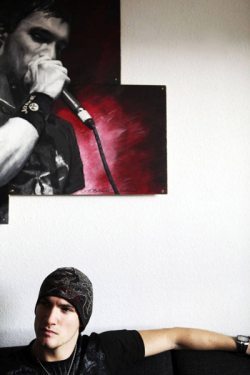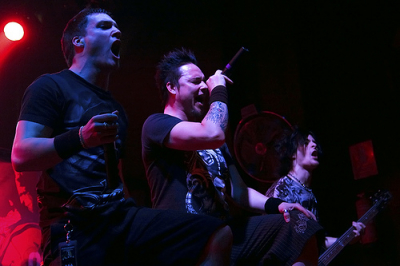Interview: The Unguided
mit Richard Sjunnesson vom 2. Februar 2011
Richard Sjunnesson (The Unguided) – Gründer und ehemaliger Frontmann der schwedischen Melodic Death Metaler „Sonic Syndicate“ – berichtet uns von den Anfängen seiner Musikkarriere, persönlichen Erfahrungen mit dem Musikbusiness, seinen ganz eigenen Höhen und Tiefen, uvm. Außerdem gibt er uns einen Ausblick auf sein jüngstes Bandprojekt „The Unguided“, dessen Debut-Album sich momentan in Pre-Production befindet. Wir danken ihm für das Interview!
The Interview:
Arne: Hi Richard! First of all, thanks for taking the time for this interview.
Richard: You are very much welcome! The honor is entirely mine.
Arne: What we’d really like to know is: How did you come in contact with self-made music for the first time? What ideas, events or experiences eventually lead to the founding of Sonic Syndicate? Did you ever think about the later genre of your music, or have you been a (melo)death man ab initio?
Richard: First contact I ever had with homebrewed music was back in 2000 when we started a band called, “Tunes of Silence.” I got the privilege to stand behind the mic, and with that also came the responsibility to write lyrics. Straight after first rehearsal, I plunged into the writing of my very first song that we had jammed out during the session. The song was called, “Silent Night,” and was a traditional rock song really from what I remember. For me, that was the first contact I had with self-made music.
The founding of Sonic Syndicate, or actually more correctly, Fallen Angels, (which was the band name during the early demo days until first album release) was really the fruit of the Tunes of Silence downfall. My brother, Roger, and I didn’t get along very well with the other members, who wanted to play a totally different genre. So, we imperceptibly stole the drummer and took our leave from Tunes of Silence to establish Fallen Angels. At the time being, we had taken more and more interest in heavy music as well, and welcomed Melodic Death Metal into our lives. That was also the genre we wanted to pursue in Fallen Angels. We added more members to the line-up as we saw fit, and got signed in 2005 by an American label called, Pivotal Rockordings. Then, shortly after, we released our first album, Eden Fire, under the name of Sonic Syndicate.
I’m very open-minded when it comes to music BUT I prefer metal before all other genres. I don’t necessarily have a strict diet only consisting of melodeath. I like all sorts of metal, to be fair. As for the latest album by Sonic Syndicate, I don’t have much to say about it more than that it doesn’t appeal to my liking. Not all songs apply to this, but in general I have a really hard time with that particular effort and musical direction.
Arne: Do you think that any other bands significantly influenced your music in general? Do you think the same in matters of your lyrics?
Richard: Dark Tranquillity, Sentenced, Blind Guardian, Iced Earth, In Flames all influenced me a great deal both musically and lyrically.
Arne: How did you “learn” to sing/scream/grunt? Did you get professional lessons? Did you teach yourself? If so, how? And have you been musical from the very beginning, a natural so-to-say?
Richard: I wouldn’t say what I do is really musical in any sense. It’s more of a rhythmic noise. But yes, I’m self taught, and learned the technique back in 2002. No professional lessons other than the hard school of the cold, harsh touring roads, hehe.
Arne: A lot of people are wondering if one can actually “learn” to sing in metal. In my experience, a lot of small local bands tend to fall back on grunting if their singers can’t actually sing. What do you think about all that? In general, what are your recommendations for newcomers and growing bands?
Richard: For me it was the other way around really. I started my vocal journey with clean singing. By the time we started Fallen Angels, I thought clean singing was lame. I thought growling was the way to go, and totally turned my back on everything else. Tips to any newcomers are to take vocal warm-ups, and vocal care serious. If you are brand new, be sure to find your own voice but don’t be afraid to be influenced by singers you respect and look up to. I believe mimicking other singers is a great way to develop vocally.
Arne: We know that a lot of fans have tons of questions they would like to ask you. Now think the other way ‘round: If you had the time to ask any metal fan in the world a few questions, what would that be?
Richard: I’m a huge metal fan myself, so I could simply ask myself the question. ;) I guess I’d ask, “What’s your favorite Star wars movie, and why?” maybe. Or, “What kind of bands do you listen to and what are you all time favorite songs?”
Arne: As a general question, what significance did the music have in your life all the time? Friends first? Job first? When did the music actually become your life?
Richard: I guess music has imbued my life for a very, very long time and I would never even be able to live and maintain a life without it. I think it started with Iron Maiden, Helloween, Manowar, and Blind Guardian in my early years. That’s when it went from being something on the radio and in the background, straight into my heart and the foreground of my life. In 2007 I could also financially live on the music, and have been doing that until I quit the band.
Arne: As for your own band, what were your first successes and disappointments? What events/situations/circumstances surprised you the most? In the positive as well as in the negative sense. What problems occurred? Was there anything that you had expected to be completely different from what you later found it to be? What were – in your opinion – the most important steps on your way to a well-known band throughout the world.
Richard: I remember entering the studio for the first time recording the “Black Lotus” demo 2003 was a big step for us. Also, earning a record deal back in 2005, and being in the studio recording the debut album was huge as well. Another milestone was getting signed to Nuclearblast in 2006, which housed so many bands I grew up with. Playing Wacken Open Air in front of thousands and thousands of people, and recording the first music video was also something I keep close at heart. A big disappointment was that the more I leArned about the music business, the more I despised it. I’ve grew to understand that a lot of bands and band members I’ve been putting on pillars growing up are a landslide away from what you expect them to be when you meet them in person. Most of the time, they come across being very mortal and down to earth while when you are little, and you rather think the opposite of that. I was disappointed seeing the band I built from scratch being ruined by external and internal sources. The most important step of getting as far as we did was probably how ambitious we were. We always gave our all on stage, and managed to nail down a few good records and singles.
Arne: What would you say has been the most enlightening moment in your history as a musician? Any especially memorable stories (anecdotes) you would like to tell us?
Richard: Studio recordings are always enlightening and educational. I also remember sitting up with Mikael Stanne (Dark Tranquility) late o’clock in the tour bus, drunk, and talking about the most random things (still very educational) like lyrical inspiration, dos and don’ts when it comes to writing, and the questions why we started with the kind of vocals we do, came to the surface. And my answer was that he was the only reason why I even started to take interest in those kind of vocals. Awkward situation but true in any sense. He blushed!
Arne: How had you generally been involved in the band’s songwriting? How did you all actually create the music? Did you write lyrics first and then chords etc. were added, or vice versa? What did you find to be most difficult in writing or coordinating the whole process? What did you like most?
Richard: Most of the time I write lyrics, melodies and vocal arrangements out from midi files sent out from my brother. The files include pretty much a full song and all the instruments in a midi format. Of course, you need to learn to hear beyond the limitations of the Nintendo 8-bit like sound, and put it into reality in your head. But it’s out from that where I structure all my vocals, lyrics, melodies, and arrangements. With the technology of today, it’s easier for everyone to have a home studio, so now we send songs and vocals back and forth, which is a bit closer to how it will sound professionally recorded.
I think it’s hard when you put yourself into a corner lyrically or arrangement-wise, but there’s usually ways around the problem. I also think it’s hard to collaborate with other people when it comes to lyrics, as was the case with some of the songs on the latest Sonic album. I hate that because I always have a vision, and if someone gets to infiltrate that, it ruins a lot of the fun for me. I think writing lyrics is what I like the most in the process.
Arne: Personally, which of your own lyrics are your favorites and why? What songs and lyrics from another band would be among your favorites?
Richard: I think “Plans are for people” came out well. “Red Eyed Friend,” “Flashback,” and “Jailbreak” are cool. I have a hard time to be objective on my own stuff, so I really don’t know. I’m proud of everything I ever did, and I don’t see how one song is better or worse than the other. The lyrics of “Monochromatic Stains,” by Dark Tranquility really get to me. And all lyrics by Blind Guardian and Iced Earth are very clever and well executed.
Arne: If you would have to describe the music you want to make – regardless of whether you think you actually did make it – how would you do that?
Richard: I would describe my optimal music composing as heavy, yet very melodious. Raw and harsh passages when it calls for just that. I also want it to be extremely emotional and beautiful. Very dynamic, so-to-speak! Clever lyrics that stimulate intellect, and take you to dreamy places where you would not expect to end by the means you have yourself. More under the surface that meets the ear and eye.
Arne: What aspects of music are the most valuable in your opinion? Do you intend to make music for others or rather for yourself? Or maybe both?
Richard: I always write music for myself. If other people enjoy what I do, that’s good for them! On the other hand, if they don’t like it, I still wouldn’t change a thing. I always write what I think is good, and that is important to me.
Arne: Did you ever feel like being overwhelmed or even stuck in life, caused by the music and/or the stress? If so, how did you get out of that? What are your general methods to deal with it?
Richard: I’m extremely stressed all the time. I’ve leArned to live with it, and turn it into an advantage. Stress is the fuel of my life, without it I wouldn’t get much done at all. Very motivating!
Arne: ‘The Unguided’ is your new band project. Can you tell as a little about it, the upcoming songs, the genre and what to expect in general? What are the things most important to you for this restart? Are there any past mistakes you are trying to avoid this time? Anything from the past you would like to redo?
Richard: THE UNGUIDED will be what Woodstock was to the hippies. Total freedom! With the upcoming songs, I think we captured what people like and enjoyed of the old Sonic and slapped a few surprises in there. People will recognize themselves in the sound, however. We have leArned to not have any middle hands in this project, and we, the band, will be in total control at all times. It’s modern, melodic metal, leaning towards what some define as melodic death metal. The most important thing of this reset in my life is to be able to pursue exactly what I want in my musical career when it comes to creativity. Something I should have done a long time ago. I don’t want to redo anything, really. What’s done is done, and it generated plenty of experience. This time I know what paths to follow, and what paths to stay away from, and also what people I can league up with and trust.
Arne: How are you doing right now and how are you working? What would your daily routine look like at the moment?
Richard: I’m working fulltime as an electrician, while dedicating all my free time to the music of THE UNGUIDED. I don’t sleep very much, and keep myself busy at all hours at the day. A daily routine could look like this. Get up at 0500, inject coffee into the brain -> Work from 0600 – 1400 -> Go to the gym 1400->1500 -> Get home to work with the music, writing lyrics, recording vocals in my homes studio, answering mails, writing blogs, and everything administrative for THE UNGUIDED. -> Repeat.
Arne: A personal question. What (amazing/bizarre/strange/cool/…) things have you done in your life most other people probably have not? Are there any things of this kind you are still planning to do?
Richard: Well I’ve quit a successful touring band that took me around the globe for years to pursue what was my dream. I don’t think every human being would find it in him/herself to conjure strength to do something like that, and it occurred odd to a lot of people. And, the fact that I have underwear in my wardrobe that has been to more places on the planet than the average Joe feels good as well. I’m planning to stay on route with my dream and vision now until the day I die, and there’s not much anyone can do about that.
Arne: Anything more you would like to tell your fans?
Richard: You guys are the best fans a person can have! The endless care and support you carry in yourself for me are truly inspiring, and I will do everything in my power to never disappoint you again. Nightmareland is just around the corner, hold tight!
Arne: Richard, thanks again for your time! We wish you all the best for your new project and are very curious about any new stuff by you and The Unguided!
Richard: Thank you!
Image and „The Unguided“ artwork usage permitted by Richard Sjunnesson.
Interview date: 28th January 2011.
Interview date: 28th January 2011.
Moderation: Arne Luaith
Das Verfassen neuer Kommentare ist derzeit deaktiviert.
Nicht genug?
Diese Magazininhalte könnten dich ebenfalls interessieren!
Kategorie:
05.02.2014Filter
Video-Interview27.06.2011Filter
Video-Interview05.03.2014Ugly Kid Joe
Video-Interview28.10.2013Children of Bodom
Video-Interview09.07.2013Five Finger Death Punch
Video-Interview18.03.2014Dark Tranquillity
Video-Interview07.08.2013Soilwork
Video-Interview14.04.2013Kalmah
Video-Interview04.09.2013Mustasch
Video-Interview06.05.2013Bornholm
Video-Interview20.03.2012Kaltfront
Text-Interview03.05.2014Soilwork
Video-Interview23.09.2012Amaranthe
Video-Interview29.08.2012Insomnium
Video-Interview09.10.2012Ghost Brigade
Text-Interview04.03.2012Akrea
Text-Interview06.09.2012Darkest Hour
Video-Interview21.01.2013Agnostic Front
Video-Interview29.11.2012As I Lay Dying
Video-Interview27.08.2012Dead by April
Video-Interview
Video-Interview27.06.2011Filter
Video-Interview05.03.2014Ugly Kid Joe
Video-Interview28.10.2013Children of Bodom
Video-Interview09.07.2013Five Finger Death Punch
Video-Interview18.03.2014Dark Tranquillity
Video-Interview07.08.2013Soilwork
Video-Interview14.04.2013Kalmah
Video-Interview04.09.2013Mustasch
Video-Interview06.05.2013Bornholm
Video-Interview20.03.2012Kaltfront
Text-Interview03.05.2014Soilwork
Video-Interview23.09.2012Amaranthe
Video-Interview29.08.2012Insomnium
Video-Interview09.10.2012Ghost Brigade
Text-Interview04.03.2012Akrea
Text-Interview06.09.2012Darkest Hour
Video-Interview21.01.2013Agnostic Front
Video-Interview29.11.2012As I Lay Dying
Video-Interview27.08.2012Dead by April
Video-Interview
 Richard Sjunnesson
Richard Sjunnesson
 The Unguided
The Unguided
Kommentare von Besuchern